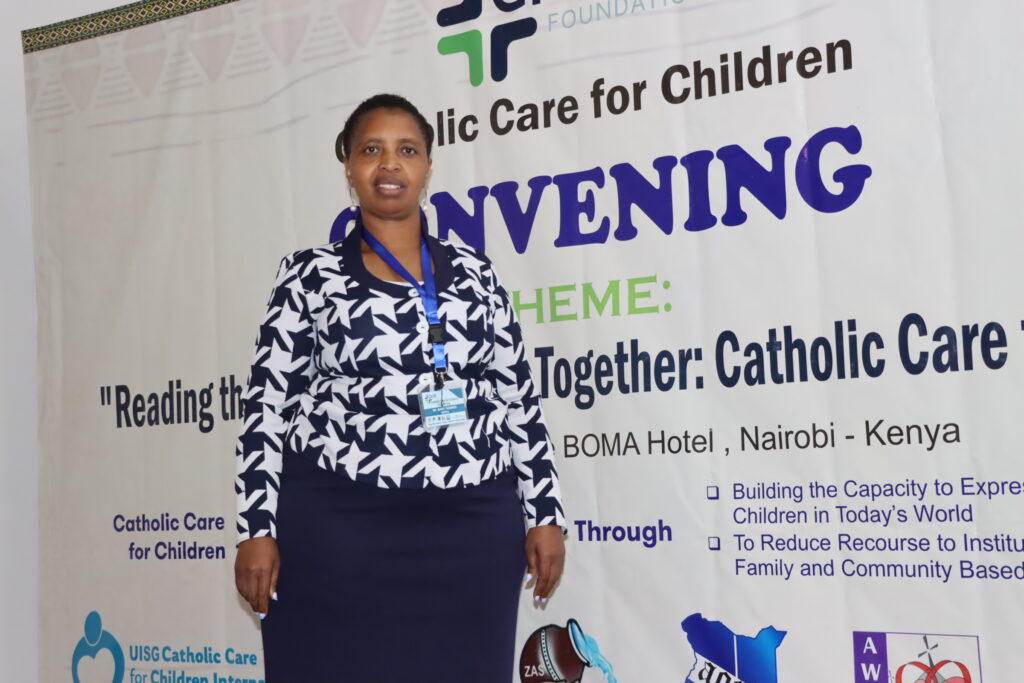AMECEA/CCC: Governments Advocate for Multisectoral Collaboration on Care Reforms

Sr. Jecinter Antoinette Okoth, FSSA
The government of Kenya and Malawi represented at a conference discussing ways for de-institutionalisation of children to family and community-based care, have unanimously shared the need to champion multisectoral coordination and collaboration on care reforms.
In an interview with AMECEA Online on the sidelines of a conference on Catholic Care for Children (CCC), Mrs. Mary Thiongo the assistant director at national council for children services in Kenya shared that there is need for more collaboration and involvement with various partners for the realization of raising children in family-based care.
“Our responsibility as a government is to ensure that children are prepared to go back to families. At the same time, families need to be ready to receive the children as we address the push factors that cause these children to end up in institutions,” Mrs. Thiongo shared on Thursday, May 18, adding that “In this case collaboration and partnership is key.”
Emphasising more on why care reforms is necessary, the government official who has served in children service department for over 15 years said, “We need to bring up our children in a holistic manner where they grow and thrive both physically, mentally spiritually, emotionally and socially so that they are whole and they can realize their full potential.”
On collaboration and partnerships among stakeholders Mrs. Thiongo shared, “the government plays it part by providing cash transfers to cushion the vulnerable house-hold. On the other hand, the Church has a role to play and other stakeholders have their roles including families.”
Mrs. Thiongo disclosed that according to the Kenyan constitution the government has also the responsibility on social protection to empower families that are not able to care for their children.
In this regard, on International family day that was marked Monday, May 15, the government launched parenting program, meant to help strengthen families before it comes to parenting.
This Mrs. Thiongo said, “is because most of the cases that have been reported are as a result of neglect since parents and care givers at times lack capacity to care and nurture their children.”
Besides she continued, “The government is advocating for investing in early years of child development because they are the formative and most critical years. Once we invest properly in our children, we shall have strong families, strong communities and by extension a strong nation.”
For a successful transition from institution to families, the government of Kenya gave a 10-year period hoping that by 26th July 2032, children will be in families or community- based care.
“As much as we are transitioning from charitable institutions, according to the constitution, the county government has a mandate and a role to establish child care facilities,” the government representative narrated during the Thursday interview adding that, “In case some children will still be in institutions after 2032, they will be transferred to a government facility.”
Stressing on the essence of collaboration by all stakeholders Mrs Trofina Limbani, the Principal officer for family and social welfare services in Malawi shared at a discussion panel that the government is fully in support of care reforms.
 “In Malawi we are supporting the transition. As a government we really need support from different partners and stakeholders to advance the agenda of care reforms,” Mrs. Limbani who provides counselling and therapy to children disclosed and added, “family is the best place for the growth of a child and we cannot run away from this.”
“In Malawi we are supporting the transition. As a government we really need support from different partners and stakeholders to advance the agenda of care reforms,” Mrs. Limbani who provides counselling and therapy to children disclosed and added, “family is the best place for the growth of a child and we cannot run away from this.”
According to Mrs. Limbani, the government of Malawi first conducted a feasibility study “looking at issues of doing rigorous assessment of both families and communities, issues of child care institution preparation and then reintegration of the child.”
She appreciated that extended families still exist in the country, but it is weakened because of leaning so much on institutional based care.
“We are therefore strengthening families through social protection programs like Social cash transfer program that we would like to link with these children that are in a child care institution,” the Malawian government representative shared.
She concluded, “We would also like to strengthen foster care program so that children who do not have parents or relatives could be placed with foster parents and also promote local adoption.”


